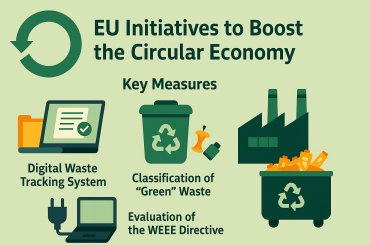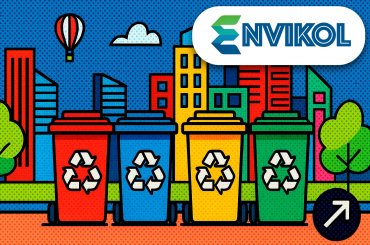
As we have already informed you during our on-line workshop* by the beginning of December 2019, another amendment of the Waste Act (Act No. 79/2015 Coll. on waste, amending certain acts, as amended - hereinafter referred to as the Waste Act) was adopted and entered into force. The amendment was focused mostly to the transposition of the European legislation, so called “Waste Package”, and partially also to the Directive on reduction of environmental impact of certain plastic products.
Waste Act was actually amended by the Act No. 460/2019 Coll. Certain parts of the amendment provisions became effective by the day of its release, namely December 27th, 2019.
Effectiveness of another provisions was delayed to different deadlines (since July 1st, 2020 until January 1st, 2023).
Modifications of the Waste Act from the point of view of producers of packaging and non-packaging products
Modifications effective since December 27th, 2019:
- Modification of very light plastic bag – specification of use for non-packaged foodstuffs and prevention of food wastage
„Very light plastic bag is a plastic bag with the wall thickness lower than 15 micrometers that is required as a primary package for non-packaged foodstuffs from hygienic reasons, or that helps to prevent food wastage.“
Art. 52, par. 28 of the Waste Act
- Modification of the obligation to provide plastic bags for purchase of goods – all plastic bags shall be provided against payment, covering their cost as a minimum requirement (except of the very light plastic bags), and an alternative shall be offered instead, e.g. paper or textile bags.
„Producer of packaging who provides plastic bags for purchase of goods or products is obliged to provide
- them against payment covering their cost as a minimum requirement; this obligation does not apply for providing of the very light plastic bags,
- also alternative types of bags.“
Art. 54, par.5 of the Waste Act
The obligations related to plastic bags (modifications resulting from the amendment are highlighted by green color):

Hrúbka steny tašky (µm) – wall thickness of the bag (µm)
Evidencia – Evidence
Poskytovanie za úhradu – Providing against payment
Poskytovanie iného druhu tašky – Providing of another type of bags
termín povinnosti od - Obligation effective since
1.10.2017 – October 1st, 2017
1.1.2018 – January 1st, 2018
27.12.2019 – December 27th, 2019
1.1.2018 – January 1st, 2018
27.12.2019 – December 27th, 2019
Modifications effective since July 1st, 2020:
The Act will be complemented since July 1st, 2020, by new definitions as oxo-degradable plastic or oxo-degradable plastic bag, single-use plastic product. A single-use plastic product shall be “a product made partially or entirely from plastic that was not designed, produced nor introduced to the market with intention to overcome several cycles or rotations during its lifespan, provided that it will be returned to the producer for refilling or for reuse for the identical purpose for which it was produced” (Art. 52, par. 30 of the Act).
Term „multilayer combined material “ is replaced by term “composite packaging” – „packaging composed of two or more layers from different materials that are not manually separable and that are a component of an integrated unit comprising the inner packaging and the outer envelope, and that is intended to be filled, stored, transported and emptied as such.“ (Art. 52, par. 32 of the Act)
Modifications effective since January 1st, 2021:
So called eco-modulation should be applied since this date, i.e. adjustment of the amount of contributions from the producers after consideration of durability, reparability, reusability, recycling potential or presence of dangerous substances. The products easily recyclable should be preferred at the expense of less recyclable ones.
Modifications effective since July 3rd, 2021:
Introduction to the SR market of single-use plastic products listed in the Annex No. 7a of the Waste Act, and oxo-degradable plastic products will be prohibited since the above date.
Single use plastic products that shall not be introduced to the market: |
cotton ear swabs (not covered by a special regulation, e.g. on pharmaceuticals) |
cutlery (forks, knives, spoons, chopsticks) |
plates |
straws (not covered by a special regulation, e.g. on pharmaceuticals) |
stirrers for beverages |
balloon sticks and conjoint mechanisms (except those for professional / industrial use that are not delivered to consumers) |
food containers made from EPS (containers with or without lid), intended for: |
- direct consumption or „take-away“ |
- usually direct consumption from this container |
- ready consumption without additional processing |
beverage packaging made from EPS including their seals and lids |
beverage cups made from EPS including their seals and lids |
Distribution of these products will be allowed until December 31st, 2021.
The amendment contains also the increased recycling targets for packaging waste, it regulates the targets for municipal waste handling. Since July 1st, 2020, also the municipal waste definition itself is modified, in parallel with the responsibility for its handling. The particular impacts of these modifications to the waste management system operation in Slovakia will be recognized later.
The amendment also regulates and complements the PRO obligations (among other changes it introduces so called financial guarantee of the PRO to be deposited by each PRO), obligations of the Coordination Centers, it complements the prohibitions related to waste landfilling and incineration, cancels the obligation for municipalities to elaborate the Waste Management Plans. It also cancels the exceptions for biologically degradable municipal waste, regulates the reporting obligations for the waste re-purchase facilities towards the municipalities, it introduces new obligations for school facilities performing packaging waste collection and collection of waste from non-packaging products (so called “school collection”), it introduces the obligations for the weighing equipment installed on the waste collection trucks, and many others.
Moreover, the newly adopted Act No. 302/2019 on depositing of single-use beverage packaging shall not be forgotten. It introduces the depositing system for single-use plastic and metal beverage packaging itself as late as in the year 2022, however, it comprises also the provisions related to the Waste Management Information System (ISOH), according to which the evidence and reporting obligations should be met only by electronic means via the ISOH since the year 2021. Similarly, the registrations or the applications related to the decisions should be also submitted only via the ISOH.
Our clients are still offered to see the workshop to the modifications resulting from the above mentioned legislation amendments on our YouTube channel “NATUR-PACK for public.” The log-in link was sent electronically by the NATUR-PACK Newsletter.
* in case you did not yet follow the on-line workshop for PRO NATUR-PACK clients “Modifications in the waste management legislation”, contact please your commercial representative.
January 9th, 2020


